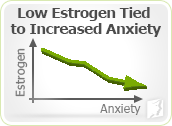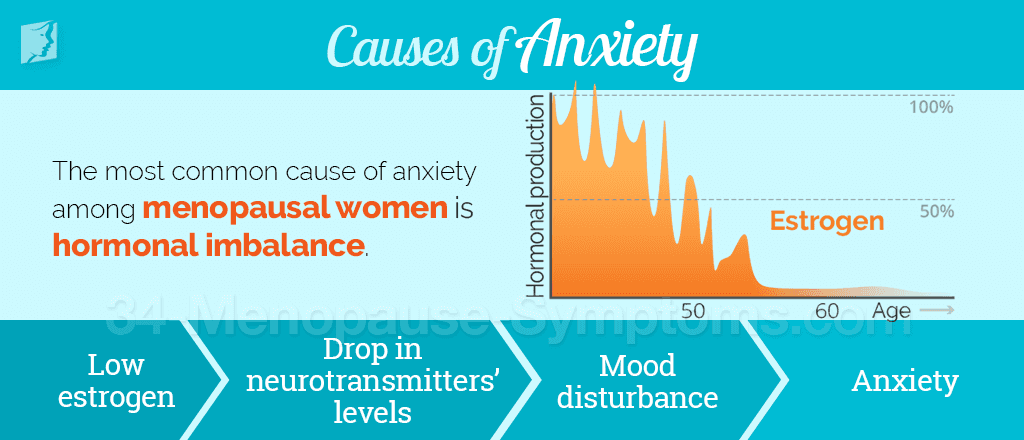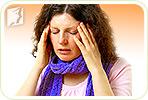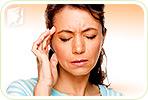
While anxiety is the result of a complex interplay of social, biological, and psychological factors, hormonal changes are often the root cause of anxiety during menopause. Because of fluctuating estrogen levels, a menopausal woman may experience unsettling differences in the way she feels. She may find that she is easily irritated, worries more than she used to, feels down, or suffers from a general sense of anxious tension.
Because the exact causes of anxiety are complex, it is important for a woman who is experiencing this symptom to understand all of the possible causes. By better understanding the underlying causes of her anxiety, a woman can find the help she needs in managing it.
Read on to discover how hormonal changes can contribute to anxiety in menopause and to learn about other possible causes of anxiety.
Hormonal Causes of Anxiety
Hormone fluctuations that occur during menopause are one of the primary factors associated with anxiety disorders during this life stage.
Researchers are studying the effects of estrogen on the brain's regulation of mood and emotions. While this relationship is complex, experts do know that changes in estrogen levels have a direct effect on the neurotransmitters serotonin, norepinephrine, dopamine, and melatonin. Since all of these neurotransmitters play an integral role in emotion and mood regulation, disruptions caused by estrogen fluctuations can lead to anxiety during menopause.
While hormonal disruptions are often the primary cause of anxious feelings during menopause, other factors can also cause or contribute to anxiety. Read on to learn about the other causes of anxiety.

Other Causes of Anxiety
Anxiety and Genetics
Studies have found that the brain areas that control fear responses may play a role in some anxiety disorders. Anxiety disorders can also run in families, suggesting that a combination of genes and environmental stresses are to blame. The role of brain chemistry is also being investigated.
Besides the primary cause of hormonal fluctuations, other conditions can trigger anxiety. Some mental health experts explain that, psychologically speaking, anxiety is often the result of unexpressed negative feelings about some problem.
A woman may not be completely aware that she is experiencing these feelings. In fact, denying, repressing, or otherwise failing to acknowledge these feelings is often the reason why a person begins to develop anxiety.
In addition to this possible psychological cause of anxiety, certain physiological conditions can cause or contribute to anxiety. The following are common physiological and psychological causes or triggers of anxiety:
Physiological Causes of Anxiety
- Genetics
- Other menopause symptoms, such as night sweats and hot flashes
- Certain medications
- Illicit drug use
- Excessive caffeine
- Heart attack
- Hypoglycemia
- Lack of oxygen
Psychological Causes of Anxiety
- Employment stresses
- Family issues Health problems
- Financial stress
- Past or recent emotional trauma
- History of psychological illness
- Interpersonal relationship strains
- Personality predisposition
Concurrent Health Conditions
Anxiety and Sleep Disorders
Recent research shows a clear link between anxiety and sleep disorders. For example, sleep deprivation greatly increases the risk of anxiety. Moreover, some form of sleep disruption is present in nearly all psychiatric disorders.
Why?
Lack of sleep stimulates parts of the brain associated with depression, anxiety, and other psychological disorders.
A vicious cycle:
For those living with anxiety disorders, insomnia is part of a vicious cycle. Many symptoms of anxiety disorders can cause sleep deprivation. This lack of sleep then increases the risk and severity of anxiety.
Anxiety is rarely an isolated condition. In fact, it is very common for anxiety to develop in tandem with one or more other conditions.
These conditions include:
- Thyroid disease
- Depression
- Drug or alcohol use and abuse
- Sleep disorders
If concurring with anxiety, these conditions must also be addressed. Often, treating these other conditions can help to ease symptoms of anxiety. For example, medical treatment for a thyroid disorder may help to alleviate anxiety symptoms. Thus, it is important to identify and treat other conditions that may develop in addition to anxiety.
Understanding the causes of anxiety can greatly help a woman determine the best way to seek relief from these troublesome symptoms. The next step is to understand what treatment options are available. Keep reading on to learn more about anxiety treatment.
Sources
- Amin, Z. , Canli, T. & Epperson, C.N. (2005). Effects of Estrogen-Serotonin Interactions on Mood and Cognition. Behavorial and Cognitive Neuroscience Reviews, 4(1), 43-58. Retrieved from http://www.ncbi.nlm.nih.gov/pubmed/15886402
- Bromberger, J.T. et al. (2013). Does Risk for Anxiety Increase During the Menopausal Transition? Study of Women's Health Across the Nation (SWAN). Menopause, 20(5), 488-495. doi: 10.1097/GME.0b013e3182730599
- National Institute of Mental Health. (2016). Anxiety disorders. Retrieved May 4, 2016, from http://www.nimh.nih.gov/health/topics/anxiety-disorders/index.shtml
- Office on Women's Health. (2010). Menopause and mental health. Retrieved May 4, 2016, from http://womenshealth.gov/menopause/menopause-mental-health/



